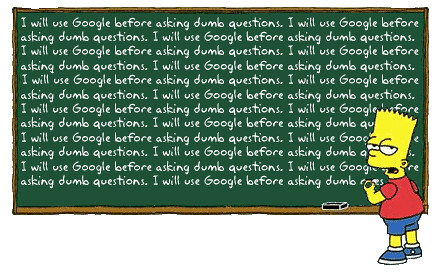Dumb Dumb Dumb
It's interesting and intriguing how some people spread ignorant hearsays or ask stupid questions on forums or blog posts, when things could have been easily verified or answered by googling or wiki-ing.
Isn't the complacency dangerous?
p/s: Some might contend that wikipedia is not always accurate, but from my personal experience it's usually much accurate than most hearsays.








9 comments:
Hahaha! I like that picture. Google rocks!
I'm just asking for punishment here but... do you have specific examples? :D
Day-dreamer: :)
Shoufarn: There wasn't anything specific in mind when I wrote that, this ask-stupid-question and say-stupid-stuff thing have always been my petty peeve about certain people's online behaviour.
For example, in ReCom, you always find people saying "hey how should I study for my SPM" when there are already thousands of discussion posts if he or she bothered to do a search.
Another thing which irks me a lot is the spreading of urban legends like "hey you can't eat shrimp and vitamin C together, you will die of arsenic poisoning!", "if you do this this this, that that that will happen" and stuff like that. I am sure that people who forward the email or post it on blog or forum have kind intentions; but those kind of hoax-y claims could always be clarified online by simply googling. Snopes.com is a good place to start.
If people haven't bothered to google then they can't be too desperate :P
I'm less peeved with urban legends - amuses me always.
Hard to draw a fine line, still (Shou Farn's accustomed to my facetious biology inquiries). Personally I find it sad that the clicks on the SPM and trial paper threads are ten times that of all others combined.
Haha but ReCom is a student network anyway, and since its user base is mostly SPM and STPM students, and that the Malaysian education system doesn't allow much free time for "not-so-relevant" knowledge, it's hard to place any blame on anyone at all. Just something lamentable I guess.
It's hard to imagine how our world will be shaped in the future. If you can go back to the world centuries ago, you could face great difficulties to convince people how the world today looks like.
We have so much technologies which everyone in the past didn't even have thought of. One thing for sure, human beings in the coming centuries will have explored so much things that we, in this century, wouldn't even have thought about. One day, your grandchildren may be fascinated with the library and uni, just like how we feel about Great Bath and Parthernon.
Wait anonymous, are you sure you commented on the right post? :D It doesn't seem relevant to this post.
Everyone always have his own way of getting information he needs. Maybe wikipedia can be more reliable than most hearsays, but such comparison is not suffinct to support wikipedia is most reliable.
Agreed. :) I think people who think that wikipedia is the most reliable source (are there any?) are ignorant of its open nature.
But from my experience though, whenever there is a hearsay or urban legend, wikipedia usually provides a good, relatively well-referenced clarification of the topic. In fact I haven't come across a single glaring error in wikipedia articles, and I would like to be pointed to totally erroneous articles if someone is aware of it.
I do not think that wikipedia is the most reliable resource in the world. That honourable title goes to nothing except for careful verification of all sources by ourselves, but even then the biasness in our conclusion and interpretation is still a rather subjective topic of contention. However, encyclopedias like wikipedia do provide a good starting point for a forage into an issue, and the referenced articles from wiki are often quality research starters too.
Having said all that, I agree that in the end a critical, skeptical mind is still the best tool in evaluating information. Nothing beats a rational mind.
Post a Comment